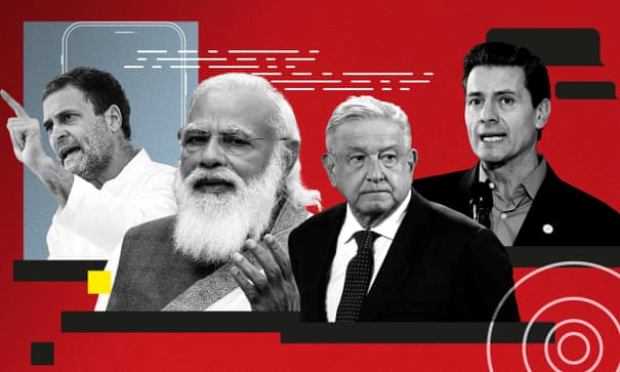NSO clients spying disclosures prompt political rows across world
Concerns that phone-hacking software may have been used to spy on political opponents spark fury
By Nina Lakhani, Michael Safi, Dan Sabbagh, Shaun Walker, Stephanie Kirchgaessner and Hannah Ellis-Petersen
LONDON – Revelations about the use of spying tools sold to governments by NSO Group sparked furious political rows across the world on Monday (19) after evidence emerged to suggest the surveillance firm’s clients may have sought to target their political opponents.
Amid growing concern over the apparent abuse of NSO’s powerful phone-hacking spyware, Pegasus, Amazon confirmed it had already cut some of its ties to the Israeli surveillance company. The stock price of Apple dipped amid worries about the privacy and security of its handsets.
NSO claims its surveillance tools are sold to carefully vetted government clients who are only permitted to use them for legitimate investigations into crime and terrorism. However, the Pegasus project, a consortium of media including the Guardian, revealed that:
At least 50 people close to Mexico’s president, Andrés Manuel López Obrador – such as his wife, children, aides and doctor – were included in the list of possible targets when he was an opposition politician.
Rahul Gandhi, the most prominent political rival of the Indian Prime Minister, Narendra Modi, was twice selected as a potential target in leaked phone number data.
Carine Kanimba, the American daughter of Paul Rusesabagina, the imprisoned Rwandan activist who inspired the film Hotel Rwanda, has been the victim of multiple attacks using NSO spyware, according to a forensic analysis of her mobile phone, although Rwanda denies it has the NSO technology.
The whistleblower Edward Snowden said he feared Pegasus was potentially so powerful that it and spyware like it should be banned from international sale. “If they find a way to hack one iPhone, they’ve found a way to hack all of them,” Snowden said, arguing spyware should be treated in a similar way to nuclear weapons where trade in the technology is heavily restricted.
Apple’s stock price fell 2.4% by lunchtime amid concerns that NSO’s Pegasus software can infiltrate and take over the latest versions of iPhones without a single click from their owner. The spyware software, which can also infect Android devices, can secretly extract and monitor the contents of a device, potentially turning on its microphone for surveillance purposes.
Apple insists it leads the industry in security innovation and that iPhones are “the safest, most secure consumer mobile device on the market”.
Amazon said it had stopped providing network services for NSO once it had learned of potential abuses of its technology, confirming it “acted quickly to shut down the relevant infrastructure and accounts”.
Meanwhile, the revelations about possible political espionage prompted a backlash in numerous countries.
The former Mexican president Felipe Calderón said he was subject to “an unjustifiable violation” of his rights when he learned he may have been selected for potential targeting, not long after his wife, Margarita Zavala, announced a run for the presidency with the rightwing National Action party in 2015. Zavala and members of her campaign team were also selected for potential targeting, according to the leaked data.
In Hungary, where Viktor Orbán’s government stands accused of using NSO’s hacking software against journalists, opposition MPs said they would convene an extraordinary meeting of parliament’s national security committee to discuss the allegations.
“If any part of this is true, even half of it, it’s one of the deepest national security scandals I have seen,” said the opposition MP Péter Ungár, who sits on the committee.
In response, Hungary’s deputy prime minister, Katalin Novák, said she “would not like to comment on press rumours”, while the foreign minister, Péter Szijjártó, said Hungarian foreign intelligence did not use Pegasus, and he was “not aware” as to whether domestic agencies used it.
European leaders also voiced anxiety about the deployment of NSO in Europe, with one calling for MEPs to hold their own inquiry. “No more ‘deeply concerned’… the EU has a dictatorship growing inside of it,” wrote the MEP, former Belgian prime minister and long-time Orbán critic, Guy Verhofstadt, on Twitter, in response to the Pegasus project allegations. “We need a full inquiry by the European Parliament!”
“Freedom of the press is a core value of the European Union,” said the European Commission chief, Ursula von der Leyen, on Monday while on a visit to Prague. She said if the allegations were true, “it is completely unacceptable”.
In India, the opposition Congress party accused Narendra Modi’s government of being the “deployer and executor” of a “spying racket”.
Gandhi said: “If your information is correct, the scale and nature of surveillance you describe goes beyond an attack on the privacy of individuals. It is an attack on the democratic foundations of our country. It must be thoroughly investigated and those responsible be identified and punished.”
The Indian government denied any wrongdoing. The IT minister, Ashwini Vaishnaw, denied the “over-the-top” media reports, which he described as “an attempt to malign Indian democracy and its well-established institutions”. But a few hours later it emerged that Vaishnaw was also among those whose numbers had been selected as a potential target, back in 2017, before he was an elected MP.
NSO Group has always said it does not have access to the data of its customers’ targets. In statements issued through its lawyers, NSO said that the Pegasus project reporting consortium had made “incorrect assumptions” about which clients used the company’s technology. It said the leaked data could not be a list of numbers “targeted by governments using Pegasus”.
In his first public comments since media the disclosures began, Shalev Hulio, the founder and chief executive of NSO, said he continued to dispute that the leaked data “has any relevance to NSO”, but added that he was “very concerned” about the reports and promised to investigate them all. “We understand that in some circumstances our customers might misuse the system,” he said.
-The Guardian


